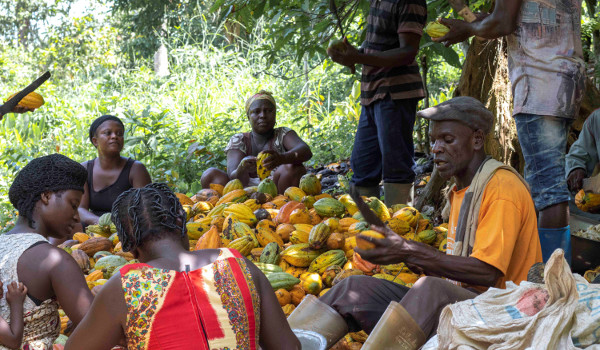While government’s budget is constrained and being reprioritised to fight COVID-19, a public-private partnership (PPP) approach could deliver sustainable cocoa production, industry experts have advocated.
Government recently launched a rehabilitation programme to cut down and replant diseased and over-aged cocoa farms across the country. About 40 percent – or 800,000 hectares of the country’s over 1.9 million hectares of cocoa farms – are either over-aged or affected by swollen-shoot virus disease.
However, given the farm size to be rehabilitated and worth of the cocoa value chain, experts believe that government alone cannot carry out the exercise – and therefore want the space opened for more private participation so as to ensure success and sustainability of the programme and the sector going forward.
“If you take the cocoa value chain, the pre-harvest activities alone are numerous. Government through COCOBOD is doing a lot, but there are more opportunities: marketing the beans is one area farmers are complaining that they feel cheated in, because of the use of adjustable scales. So, private collaboration in this sense is needed,” said Samuel Asare Ankamah, Regional Manager, Cocoa Health and Extension Division (CHED)-COCOBOD, Western South Cocoa Region.
He said several other opportunities exist for the private sector to tap into, adding that COCOBOD is ready to work with private partners who can comply with its prescriptions. “Now we are going to use sealable electronic scales, whereby this issue of adjusting will no longer be a problem; and I believe private participation is needed here.”
He spoke at Diaso in the Central Region during a trip to cocoa-producing communities in three regions – Bono, Western North and Central – that was organised by Solidaridad and CHED. The joint visit falls within the context of CHED’s new agricultural extension system, which leverages public private partnerships to provide efficient and cost-effective extension services to cocoa farmers.
“The rehabilitation programme can create tremendous opportunities for SMEs,” says Hammond Mensah of Solidaridad West Africa.
“About 800,000 hectares of cocoa farms to be rehabilitated is big business for the SMEs. Government will recruit some people to do the work, but the government also says that because of the new extension strategy it will invite some private participation into the space,” he noted.
Solidaridad – an International civil society organisation – is currently implementing the second phase of the Cocoa Rehabilitation and Intensification Progamme (CORIP II), which among other things seeks to increase access to finance for cocoa farmers, promote youth and women participation as we as promote resilience through climate-smart cocoa production.
He said, increasingly, a time is coming when it will no longer be sustainable for government to continue providing free services and inputs to farmers; hence the need to encourage public-private partnerships in the sector.
“Ultimately, we want a situation wherein government is no longer providing free services because it discourages the creation of private markets. We think that, gradually, government must begin to open up the space; but because cocoa is a strategic crop, I believe government also feels that there are not enough private sector actors to take over fully. And therefore government’s plan is to begin to work with the private sector and maybe gradually it will exit, but not immediately,” added Mr. Mensah, who is Programme Manager for CORIP and Head of Access to Finance, Solidaridad West Africa.
CORIP II
Funded by the Embassy of the Kingdom of the Netherlands in Accra, CORIP II uses public funds to leverage private sector investments from commercial banks and impact investors for cocoa rehabilitation and intensification.
The phase-two follows successful implementation of CORIP I (2013-17), which demonstrated the business case for developing the West African cocoa production and processing sector through the set-up and operation of Rural Service Centres (RSCs), a one-stop shop for delivering sustainable cocoa production services to farmers.
The RSCs are set up by entrepreneurs with technical assistance from Solidaridad as a private-sector-driven vehicle to deliver production and marketing services for smallholder cocoa farmers. The centres serve as a one-stop-shop that delivers services, such as improved planting material, agrochemicals, fertilizer, and crop protection, as well as extension and financial services.
So far, 23 RSCs have been established across major cocoa growing communities in the country. The RSCs are purely commercial service providers that work with farmers based on COCOBOD’s requirements and recommendations on how to produce cocoa
The objective of CORIP II is to speed and scale-up within the cocoa supply chain the creation of SMEs to deliver market-based intensification and rehabilitation services to farmers in the targetted countries.
“As a strategy, CORIP II focuses on large-scale adoption of climate-smart cocoa production practices in West Africa by improving cocoa farmers’ access to recommended inputs (planting material, fertiliser, crop protection), extension advice and other services (including finance) through SMEs in participating countries,” Mr. Mensah added.
He added that: “Our strategy to bring private investment into the cocoa space is actually situated in COCOBOD’s own strategy promulgated in 2010”.










